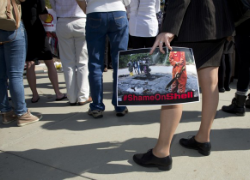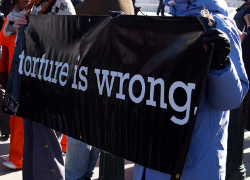The recent United States Supreme Court decision dismissing all the plaintiffs’ claims in Kiobel v. Royal Dutch Petroleum has drawn attention and mixed reactions from the international human rights community. The Kiobel decision closed the shop for foreign plaintiffs suing foreign defendants for alleged torts committed abroad.
Many international scholars, such as Second Circuit Judge Pierre N. Leval, worry that prohibiting ATS claims that do not touch and concern the United States will be a devastating blow to the human rights movement. Others, like Columbia history professor Samuel Moyn, hope the decision will be a blessing in disguise because it will shift focus to bigger picture solutions rather than “quick fixes” by the courts.
Background

(Washington Post)
The Kiobel case was brought by residents of Ogoniland in the Niger Delta area of Nigeria. The plaintiffs alleged that after residents of the region began protesting the harmful environmental effects of the defendant corporations’ oil exploration and production practices, those corporations enlisted the Nigerian government to suppress the demonstrations. According to the plaintiffs, the Nigerian military and police forces subsequently engaged in beating, raping, killing, arresting and destroying the property of the residents. The plaintiffs’ claim against Royal Dutch and the other corporations was that the corporations “abetted these atrocities by . . . providing the Nigerian forces with food, transportation, and compensation, as well as by allowing the Nigerian military to use respondents’ property as a staging ground for attacks.”
The plaintiffs filed suit against the oil companies in the United States District Court for the Southern District of New York, claiming violations of the Alien Tort Statute (ATS). The ATS provides that “[t]he district courts shall have original jurisdiction of any civil action by an alien for a tort only, committed in violation of the law of nations or a treaty of the United States.”
The ATS has a unique history. Enacted in 1789, the statute lay mostly dormant for almost two centuries before its revival by human rights activists in 1980 in the landmark case Filartiga v. Pena-Irala. In Filartiga, the Second Circuit allowed an ATS claim based on the torture and death of a Paraguayan citizen at the hand of a Paraguayan police official. The conduct at issue took place in Paraguay, but jurisdiction was proper in the United States District Court for the Eastern District of New York based on the defendant’s presence in Brooklyn, New York on a visitor’s visa.
Filartiga opened the door to subsequent civil claims for human rights abuses under the ATS, notably Sosa v. Alvarez-Machain, in which the US Supreme Court defined and narrowed the scope of such claims. In Sosa, Justice Souter, writing for the majority, explained the necessity of restraint in permitting ATS claims and mandated that only a very narrow set of claims and circumstances should be actionable under ATS. Sosa did, however, leave the ATS open as an avenue for future claims of violations of international legal norms that were “specific, universal, and obligatory.”
Which leads us back to Kiobel. The violations underlying the Kiobel plaintiffs’ claims (extrajudicial killings and torture, among others) could possibly have qualified as violations of the law of nations, as required by the ATS. However the Supreme Court’s decision to dismiss the claims turned not on the types of crimes but on the location of the acts. Chief Justice Roberts explained in the Kiobel holding that “all the relevant conduct took place outside the United States. And even where the claims touch and concern the territory of the United States, they must do so with sufficient force to displace the presumption against extraterritorial application.”
The “presumption against extraterritorial application” of US laws is a well-known canon of statutory interpretation. As Chief Justice Roberts explained, “When a statute gives no clear indication of an extraterritorial application, it has none.” According to Kiobel, nothing in the ATS indicates Congress’ intent for the law to apply extraterritorially, so the ATS does not allow courts to recognize a cause of action for violations involving foreigners occurring outside the US. Thus, the Kiobel plaintiffs’ claim was barred.
Future Impacts
Much of the debate on Kiobel’s implications focuses on the future of human rights protection, and whether and to what extent the decision will adversely impact efforts to stop human rights abuses. Many agree that that the ATS’ ability to further the human right movement is greatly diminished, if not dead. Whether the loss of the ATS as a tool ultimately hinders the entire movement remains to be seen.

(Neon Tommy)
Judge Leval of the Second Circuit Court of Appeals is pessimistic. He notes that bringing a claim in the United States under the ATS was one of a very few avenues for human rights abuse victims to seek justice and compensation. The ATS, while an imperfect solution, nevertheless has provided recourse to victims who were otherwise out of options. Leval notes that “victims seeking recognition of the wrongs done to them and compensation for their suffering cannot get relief in their home countries, and they have practically no courts available to them elsewhere.” Leval also touches on the big picture benefits of the ATS, noting that human rights suits under the ATS draw global attention to atrocities.
While international criminal tribunals were created to address many of the above mentioned issues, Judge Leval notes that criminal prosecutions in these tribunals are “infrequent, slow, and inefficient.” Leval points out that the ICC, the most prominent of the international criminal courts, has tried only ten cases in its existence and convicted just one person. Lastly, Judge Leval worries that if the United States, which is at the vanguard of foreign human rights suits, stops allowing these claims, there will be no other countries who will want to step in and fill that void.
Professor Moyn, on the other hand, appears optimistic in the aftermath of Kiobel, if only because he sees more effective ways to pursue a global human rights agenda. Moyn finds the ATS an inefficient path for human rights, noting there is “little evidence . . . that the wave of ATS litigation has put a dent in the world’s suffering.” Moyn acknowledges the individual benefits plaintiff have achieved via ATS claims, but wonders if these little victories improperly distract human rights champions away from pursuit of broader human rights goals. With the ATS crippled, Moyn envisions a future in which the human rights activists focus more on structural evils and connect with broad social movements rather than narrow litigation strategies.
Eugene Kontorovich, a professor of law at Northwestern, agrees with Moyn’s criticism of the small impacts of ATS litigation. Kontorovich notes that ATS lawsuits have only a marginal effect on the human rights crusade because they do not target the true and powerful criminals: the governments of foreign countries.
Moyn’s and Kontorovich’s skepticism over ATS claims, while seemingly looking at the big picture, misses the forest for the trees. The big picture in the human rights movement is, after all, about small groups of individuals. It is people like those in Ogoniland, and minorities groups in general, who are most in need of an instrument to seek justice. Even if we achieve improvements in human rights in the long run without the ATS, the Ogoni people now are still without their homes, families, and livelihoods. The human rights movement, at is core, is meant to stop the abuses of the few. So we must not forget about the few by proclaiming that one of the only avenues of recourse available to them (the ATS) is without great value.
Tom Scott is a graduating third year law student at the Sturm College of Law, is a Publishing Editor for The View From Above, and a Staff Editor on the Denver Journal of International Law and Policy.


